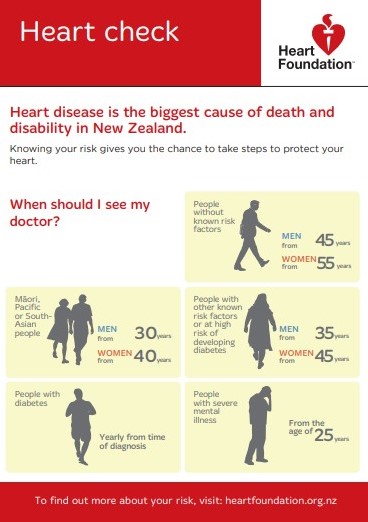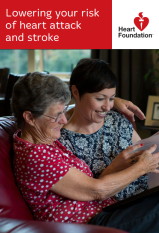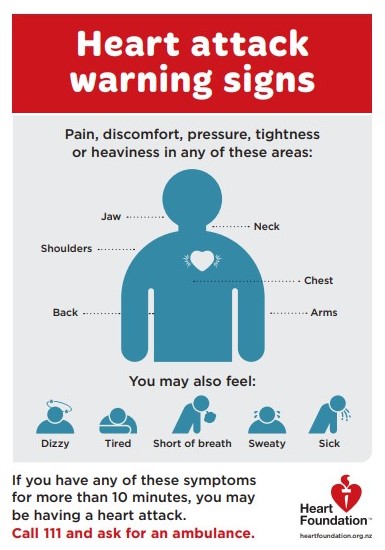You can now add Healthify as a preferred source on Google. Click here to see us when you search Google.
Heart disease | Mate manawa
Also known as cardiovascular disease
Key points about heart disease
- Heart disease (mate manawa) refers to a wide range of conditions that affect your heart.
- Heart disease remains the number one cause of death in Aotearoa New Zealand.
- It’s also a major cause of disability and other ongoing health problems.
- Your risk of heart disease is affected by many different factors – the more you have, the greater your chance of having heart disease.
- Some risk factors can’t be changed, but others can be reduced by making healthy lifestyle choices.
- Doing a heart risk assessment will help you find out your heart disease risk and the changes you need to make to lower your risk.

Heart disease is a general term for any condition that affects your heart. It includes conditions that affect the muscle, valves, blood vessels or rhythm of your heart.
Heart disease that involves narrowed or blocked blood vessels is also known as cardiovascular disease. Cardiovascular disease can lead to a heart attack, chest pain (angina) or stroke.
Heart disease is the number one cause of death in Aotearoa New Zealand. It’s also a major cause of disability and other ongoing health problems.
Many forms of heart disease can be prevented or treated with healthy lifestyle choices.
Learn more about common heart conditions, including heart attack, angina, heart failure, atrial fibrillation and heart valve disease.
Learn about how the heart works.
There are many different factors that affect your risk of getting heart disease. Some of these you can’t change, such as your age, sex and ethnicity. However, there are other factors you can change, such as whether you smoke, what you eat and drink and how much you exercise.
By making healthy choices every day, you reduce your risk of heart disease.
Learn more about risk factors for heart disease.
A heart risk assessment will help you find out your risk of heart disease by building a picture of your risk based on factors such as your:
- age
- sex
- ethnicity
- cholesterol levels
- smoking history
- blood pressure
- family history, and
- other health conditions.
The more information you provide to your healthcare provider, and the more involved you are in the testing procedures, the better the result of your assessment will be. Different people need a heart risk assessment at different ages. Find out more about heart risk assessment.
My Heart Check
As well as seeing your healthcare provider for a heart risk assessment, you can check your heart health with My Heart Check. It's a free online heart health tool designed for New Zealanders by the Heart Foundation.
It can estimate your heart age compared to your actual age, as well as give you an estimate of your risk of having a heart attack or stroke in the next 5 years. Note that this free online tool works best for people 30 to 75 years of age. You can still use it if you’re older or younger, but your result may be less accurate. You can use the information to help your healthcare provider further assess your heart risk and advise you about tests that are appropriate for you.
Use My Heart Check(external link) to find out about your heart health.
You can help reduce your risk of heart disease by doing things that can change the factors that put you at greater risk:
- Be smokefree – quit smoking and avoid second-hand smoke.
- Control your blood pressure through lifestyle changes and medicine.
- Lower your cholesterol if it's high through changes to your diet and medicine if needed.
- Aim for a healthy body weight.
- Manage your blood glucose levels well (if you have diabetes).
- Eat for a healthy heart.
- Follow low-risk drinking advice.
- Be physically active.
- Learn to manage stress.
- Seek help if you feel depressed.
Learn more about risk factors for heart disease.
Apps reviewed by Healthify
You may find it useful to look at some quit smoking apps, blood pressure apps, alcohol use apps, depression apps, diabetes apps, self-management apps and nutrition, exercise and weight management apps.
There are several different tests and investigations used to check on your heart health and to diagnose and monitor any heart condition you may have. These include an ECG (electrocardiogram) either at rest or under exercise stress, an echocardiogram and coronary angiography.
The tests your healthcare provider chooses for you will depend on your risk of heart disease, your history of heart problems and the symptoms you have.
Read more about tests and procedures for heart conditions.
There are a number of treatments for heart disease. The treatment you'll receive will depend on what particular condition you have. Treatment may include medicines, procedures such as coronary artery bypass surgery, angioplasty and insertion of a stent or valve surgery. Serious forms of heart disease that affect the ability of your heart to continue pumping properly may need a heart transplant.
If you need surgery for your heart condition, there are a few things you need to do or keep track of after you're discharged from the hospital.
- Cardiac rehabilitation – this is the term used to describe education, training and support given to people who've had a heart attack or developed heart disease. Ask your healthcare provider about what's available in your area. Read more about cardiac rehabilitation.
- Take your medicines – you'll need to take your medicines regularly as prescribed by your healthcare provider. This is to make sure that you recover well from your heart disease or heart surgery. Some of these medicines may need to be taken for life.
- Maintain a healthy lifestyle – it's important that you maintain a healthy lifestyle even after your heart disease has been treated or you've recovered from surgery. This includes healthy eating, no or low-risk drinking, stopping smoking, maintaining a healthy weight, exercising according to your ability(external link) and good control of your diabetes or cholesterol level.
- Attending follow-up appointments – your healthcare provider may set up appointments for you a few weeks to months after you've been discharged from hospital. It's important to attend these appointments as this gives them a good idea of how well you're recovering and whether any further treatment is needed.
For more information about the recovery process, see the Heart Foundation booklet Living well after a heart attack(external link) and find out about the personal journeys(external link) of people with heart disease.
Heart Help(external link) from the Heart Foundation is the go-to place for information and support for people living with heart disease, and for their whānau and friends. You will also find resources and opportunities for staying connected with the Heart Help community.
You can contact the Heart Foundation's Heart Line on 0800 863 375. This phone line is managed by a consumer care representative who can support you with heart health information, finding a heart health service and accessing resources and support.
Video: Sione’s journey
Sione, a former NRL and Kiwi rugby league international, talks about his journey towards a healthy lifestyle, including healthy eating, to help keep his heart in good shape.
(Heart Foundation, NZ, 2024)
Video: Resilience after heart issues
Eugene has a family history of heart disease and had a cardiac arrest himself in his early 50s. He talks about how he coped and the lifestyle changes he’s made to look after himself.
Watch more personal heart stories(external link) from the Heart Foundation NZ. They also have a series of longer Heart Help Live(external link) videos that provide advice from heart health professionals about healthy eating, exercise, managing stress and living with heart disease.
Heart conditions(external link) Heart Foundation, NZ
Heart treatments(external link) Heart Foundation, NZ
Pacific heartbeat(external link) Heart Foundation, NZ
Heart disease videos in NZSL Platform Trust, in partnership with Deafradio and Healthify He Puna Waiora, NZ, 2022
Apps
First aid and emergency apps
Quit smoking apps
Blood pressure apps
Alcohol use apps
Depression apps
Diabetes apps
Self-management apps
Nutrition, exercise and weight management apps
Brochures
Heart check(external link) Heart Foundation, NZ
My healthy heart journey – Tohu hauora manawa haerenga [PDF, 5 MB] Te Whatu Ora and Ministry of Health, NZ, 2023
Lowering your risk of heart attack and stroke(external link) Heart Foundation, NZ, 2025
Heart attack – warning signs poster(external link) Heart Foundation, NZ
Women and heart disease(external link) Heart Foundation, NZ
Eating for a healthy heart(external link) Heart Foundation, NZ, 2023
References
- Cardiovascular disease – impacts and risks(external link) Heart Research Institute, NZ
- What is heart disease?(external link) Heart Foundation, NZ
Clinical guidelines and resources
Cardiovascular disease risk assessment and management for primary care(external link) Ministry of Health, NZ, 2018
What's new in cardiovascular risk assessment and management for primary care clinicians(external link) BPAC, NZ, 2018
Grey C, Jackson R, Wells S, et al. Trends in ischaemic heart disease: patterns of hospitalisation and mortality rates differ by ethnicity (ANZACS-QI 21)(external link) N Z Med J. 2018 Jul 13;131(1478):21–31
See our page Heart failure for healthcare providers
Continuing professional development
Cardiac education for nurses(external link) Heart Foundation, NZ
Webinar: Cardiology update (1:11)
(Mobile Health, NZ, 2019)
Murray Hart, a clinical nurse specialist talks about the following topics:
- Management of aortic stenosis – when to refer
- ECHO report interpretation of aortic valve parameters
- TAVI as a treatment option for severe aortic stenosis – the latest evidence
- HFrEF and HFpEF
- New medications in heart failure – Entresto (Sacubitril/valsartan)
- Acute coronary syndrome – what’s new (low-risk chest pain pathways; CVD in females; oxygen in the setting of MI)
Webinar: Cardiovascular disease and COVID-19 (1:15)
Brochures

Heart Foundation, NZ

Heart Foundation, NZ, 2025

Heart Foundation, NZ
Credits: Healthify editorial team. Healthify is brought to you by Health Navigator Charitable Trust.
Reviewed by: Dr Grace Lee, FRNZCGP and Clinical Educator
Last reviewed:





